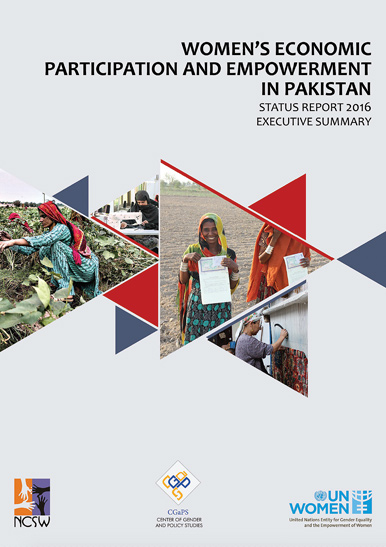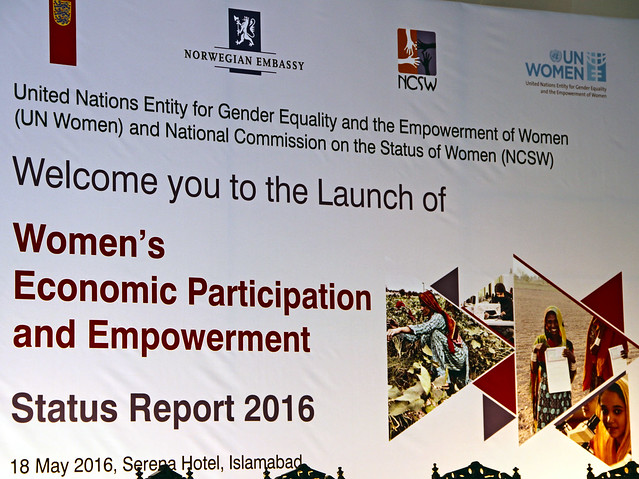Pakistan Launches its Status Report on Womens Economic Participation Empowerment
Date:
[PRESS RELEASE]
Islamabad, Pakistan – A status report on women’s economic participation and empowerment in Pakistan was launched at an event jointly hosted by the National Commission on the Status of Women (NCSW) and the United Nations Entity for Gender Equality and the Empowerment of Women (UN Women) on Wednesday 18 May 2016 at the Serena Hotel in Islamabad.
Pakistan’s newly launched ‘Women’s Economic Participation and Empowerment - Status Report 2016’ emphasizes the complex and multifaceted concept of women’s economic empowerment and in using national survey data and qualitative studies documents the status of Pakistani women to different dimensions and determinants of economic participation such as human, financial and physical capital, employment statistics and vulnerability in employment, gender wage differentials and poverty. The report also documents the economic situation of women affected by humanitarian crises and complex emergencies over the past decade.
Economic participation and empowerment of women is recognized globally as essential for the progress of a nation and growth of its economy. The Sustainable Development Goals (SDGs) adopted by the UN General Assembly in September 2015 (where Pakistan is a Member State) also recognizes the importance of empowering women - Goal 5: Achieve gender equality and empower all women and girls.
Whilst Article 38 of the Constitution of Pakistan ‘guarantees citizens the right to pursue economic opportunities irrespective of sex, caste or creed and related labour laws’, and at the same time the Government of Pakistan’s principal planning document Vision 2025 recognizes expanding women’s participation and access to opportunities as central to sustained economic and social development, the World Economic Forum’s Global Gender Gap Report 2015 ranks Pakistan 143 out of 145 countries in economic participation and opportunities and 135 in educational attainment.
The Status Report, produced with support from the Governments of Norway and Denmark, by UN Women in collaboration with NCSW looks at social and economic vulnerabilities that keep the Pakistani woman underpaid and overworked, even when she has overcome structural and social barriers to seek employment. The Report highlights specific aspects of women’s economic empowerment (such as employment, type of employment and wages, vulnerable work and the working poor), and recommends a concerted effort to improve women’s access, opportunities and capabilities in order for them to participate as full economic actors in development and growth of a dynamic Pakistan that the Vision 2025 seeks.
Mr. Jamshed Kazi, Country Representative, UN Women Pakistan, in his welcome stated: “This comprehensive report captures different facets of women’s economic empowerment from the relations between malnutrition and lesser opportunities in the workforce to the extra burden of humanitarian crisis on women. The report delineates a meticulous overview of the working women population of Pakistan. It is imperative to position gender responsive infrastructure in places such as daycare centers, anti-sexual harassment mechanisms, safe and affordable transport and accommodation options to encourage economically inactive women to join the formal workforce as well as ensure retention for the existing women workforce. Providing equal opportunities for better quality education is also critical for women and girls to improve their employment options.”
Ms. Helle Nielsen, Chargé d'Affaires, Embassy of Denmark, Islamabad in her remarks said: “Investing in girls and women is not only the right thing to do but also a smart thing to do, as research shows that investing in girls and women is the most effective investment in development, reaching far beyond the individual women.” Ms. Nielsen gave the example about how women spend 90% of their salary on their children and the health, education and well-being of their family, while men only spend 30 to 40%. She also highlighted that by removing the barriers that prevent women from entering the labour market, a country’s productivity can increase. “Investing in women’s economical participation is a direct way to gender equality, poverty reduction and inclusive economic growth, but in order for the world to experience progress, we need to give girls and women the equal opportunities to which they are entitled. This will not only benefit girls and women but societies at large”, said Ms. Nielsen. She also shared that Denmark was proud to be hosting the world’s largest global conference on women and girls’ rights, ‘Women Deliver’, which is currently taking place in Copenhagen. During this conference, a wide range of actors, including representatives from Pakistan, are exchanging ideas and solutions on how to ensure that the needs and rights of girls and women are fully taken into account in the implementation of the UN’s 2030 Agenda for Sustainable Development.
Dr. Yasmin Zaidi, Lead Researcher and Author for the Status Report 2016 and Director, Center of Gender and Policy Studies, in presenting the report highlighted: “Women’s economic work, paid and unpaid, needs to be recognized, acknowledged and tracked at District and provincial levels in Pakistan so that Pakistan can report on SDG 5. Robust data on employment and earnings will allow provinces to plan where to allocate resources so all districts can prosper and generate decent employment, and manage the flow of economic migration within the country.”
Speaking during the panel discussion, Ms. Khawar Mumtaz, panelist and former Chairperson National Commission on the Status of Women stated that “Authentic official data and its analysis are imperative to establish the reality on the ground for giving direction for appropriate policies and action. The reports significance is the multidimensional approach to the analysis of women's economic empowerment especially employment. This publication also deserves special appreciation for developing the Women Economic Empowerment (WEE) Index for the first time in Pakistan. The Index will help in ranking the WEE status by districts and provide a mechanism to measure progress and pinpoint areas that require more concerted attention.”
Ms. Sana Mahmud, panelist and Captain, National Women’s Basketball Team spoke of the gender pay gap saying: “The wage gap for men and women remains high, even within the realm of sport. Female athletes - doing exactly what the men are doing - are many at times paid less than their male counterparts. This in turn creates an even more difficult situation for women who are already struggling to participate fully and equally in sports, and are further disillusioned by the lack of incentives provided, including monetary remuneration."
Mr. Mohsin Afzal, panelist and Founder and CEO of Founder, we.R.play Studios addressed Pakistan’s untapped women workers saying: "While there is no denying that gender equity is strong moral and humanitarian issue, I feel a lot of people don't understand that it has economic implications as well. Denying equal opportunities and participation to almost half of our population [the women] simply means we're wasting a lot of untapped potential."
The Chief Guest and Chairperson of the Punjab Commission on the Status of Women, Ms. Fauzia Viqar congratulated NCSW and UN Women for producing a very informative report and stressed the importance of data collection for informed policies, actions and to measure progress. “This data would surely help us in correct decision making and we hope that the analysis would inform development schemes of the Government of Pakistan” she said.
The vote of thanks was delivered by Ms. Sangeeta Thapa, Deputy Representative, UN Women Pakistan.
To view and download the report: [click here]
Photo Gallery
For more information:
Please contact: Faria Salman
Strategic Management and Partnerships Officer & Communications Focal Point for UN Women Pakistan
Email: [ Click to reveal ]

